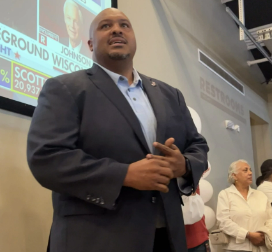
Florida Sen. Corey Simon expressed that the new legislation will increase options for families to choose the best options for their children.
Landmark legislation that would expand education choice eligibility to all Florida’s K-12 students and add spending flexibility to all state choice scholarship programs headed toward its final journey on Wednesday before being signed into law.
Sen. Corey Simon, R-Tallahassee, the sponsor of SB 202, introduced the bill but then agreed to substitute a committee version of HB 1, the House version that won final approve in that chamber last week.
Like its Senate companion, the House bill, sponsored by Rep. Kaylee Tuck, R-Lake Placid, would make all the state’s students eligible for the Family Empowerment Scholarship.
“This is about increasing options for families to choose the best for their students and options for school districts,” Simon said in introducing the bill.
Unlike in the original law approved in 2019, the program as outlined in HB 1 would be open to all students regardless of income. However, families whose incomes fall below 185% of the federal poverty line would receive first priority, followed by those with incomes up to 400% above the federal poverty line. Those with incomes above the 400% threshold would be last in line to receive any remaining funding.
Another provision in HB 1 requires that funding for the formerly income-based scholarships would first have to come from private tax credit donations that were previously used to fund the Florida Tax Credit Scholarship program before receiving money from state education funds.
In addition to expanding eligibility, HB 1 would convert traditional scholarship programs into education savings accounts. Such accounts take funds that would have been directed to an institution and allow parents to use them to customize their child’s education.
Under the bill, the funds, expected to be around $8,000 per student depending on where the family lives, can be spent on approved instructional costs, tutoring and fees for various exams in addition to private school tuition.
In addition, HB 1 also extends eligibility to homeschooled students, who would be classified separately from those whose families choose not to participate. Participating families would be under a “personalized education program” and would have to submit to an annual “sworn compliance statement” that would include various requirements such as taking a nationally norm-referenced exam or statewide assessment and report the results to the school choice funding organization.
(Step Up For Students, which manages the majority of state education choice scholarship programs, hosts this blog.)
Besides expanding options for students, the bill also would relax some district school regulations identified by the Florida Association of District School Superintendents.
For example, the bill reduces hurdles to a five-year temporary teacher certification for anyone with a bachelor’s degree and for those with two years of effective or highly effective service. The bill provides flexibility to school districts in setting salary schedules. The bill repeals the requirement that public school students have one online credit to graduate from high school, which is not currently required in private schools. The bill also offers districts flexibility in facility costs for new construction, and allows school districts to transport students in large vans as opposed to school buses if needed.
During the full Senate proceedings, opponents questioning the logistics of the bill and the cost, which Senate and House analysists had calculated differently. They also asked whether money for the scholarships would be taken out of the state’s education funding formula for public schools.
The answer, Sen. Keith Perry, R-Gainesville, said is no, although “you’ll see a big increase in that fund as well.”
Perry, who chairs the Senate Appropriations Committee on Education, said the state has separately allocated $2.2 billion for the scholarship program, with an extra $350 million in a reserve fund. Also, money from the Florida Tax Credit program will be used to pay for scholarships.
HB 1 is set for vote in the full Senate, which begins its session at 1:30 p.m. today.